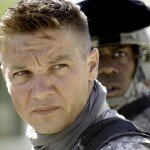While George W. Bush was prematurely touting “Mission Accomplished” from the deck of the USS Lincoln back in May 2003, super soldier Roy Miller (Matt Damon) was going Rambo through the streets of Baghdad, determined to uncover the truth as to why US intelligence was so incredibly wrong about Iraq harbouring weapons of mass destruction.
Much of that last sentence, I hope you realise, is complete hogwash; no rogue soldier single-handedly unearthed the WMD scandal, and even if he had, he most certainly wouldn’t have done it while running and gunning his way around war-torn Iraq as if it were a videogame. Yet this is exactly the kind of nonsense preached in director Paul Greengrass’ (The Bourne Identity, United 93) misguided political thriller Green Zone, a title derived from the Coalition’s safe zone in Baghdad during the Iraq occupation.
In a flagrant effort to get box office takings into the green zone of a different kind, the film abridges and drastically rewrites the messy history of the Iraq invasion to better suit Hollywood heroism, turning a potentially intelligent and provocative political thriller into little more than a generic Bourne sequel.
Even as cushy popcorn action, Green Zone misfires. Only during the opening act — where Chief Warrant Officer Miller and his outfit make a move on a suspected WMD site only to discover cobwebs – was I genuinely thrilled. Nearly all of the action that follows comes across as derivative and detached, namely because we’re given no reason to care for anyone but Miller on the battlefield. Since he’s played by leading man Matt Damon, suspense is hard to come by as you can rest assured knowing he won’t be killed off any time soon. As for the rest of his squad of brave soldiers? Who cares; we barely get to know their names.
That’s where Brian Helgeland’s screenplay stumbles: it’s so intensely focused on just one character, everyone else is reduced to cardboard cut-outs. Greg Kinnear’s character Clark Poundstone — a Pentagon Special Intelligence operative who thinks the needs of Iraq are synonymous with the wants of the US – makes for such a two-dimensional baddie, he could very well be the next Bond villain. Then there’s Brendan Gleeson as sceptical CIA chief Martin Brown, most notable for sounding like an angry pirate. Lastly, Amy Ryan portrays Wall Street Journal correspondent Lawrie Dayne, an insipid character who more accurately should have been credited as ‘Plot Device’.
Matt Damon, who always manages to look good wielding a gun, uses his understated charisma and down-to-earth disposition to prevent Miller from coming across as the superhuman action hero he really is. Along with some impressive art direction – particularly in the early scenes where we see the devastation left behind by the initial airstrike – Damon saves this film from completely bombing.
![green_zone21[1] green zone211 e1268301425339 600x266 Green Zone (Review)](/wp-content/uploads/green_zone211-e1268301425339-600x266.jpg)
Cinematographer Barry Ackroyd’s (The Bourne Identity, The Hurt Locker) notoriously shaky camera work is certainly disorienting, but thankfully isn’t as nauseating as it has been in the past (maybe I’m just getting used to it). Far more frustrating was the excessive use of film grain, which made it damn near impossible to see what’s going on during the poorly staged night-time action finale. If it weren’t for a few crystal clear cutaway shots to Army Headquarters, I would have said that the print used for the preview screening was smeared in sand.
One of the many reasons why The Hurt Locker recently left the Oscars with the title of Best Picture is because it doesn’t get bogged down in the politics of the Iraq war. Why is that a good thing? Without an agenda, the film had time to get down and dirty with the characters – you know, those things audiences connect with – making the action all the more gripping as we genuinely cared for, and believed in, the soldiers depicted. Green Zone, making the same mistakes as all the other films set in Iraq, places the politics before the people.
 Follow the author Anders Wotzke on Twitter.
Follow the author Anders Wotzke on Twitter.



![Fair Game [2010] (Review) Fair Game [2010] (Review)](/wp-content/uploads/fair_game_ver21-e1288569989173-150x150.jpg)











